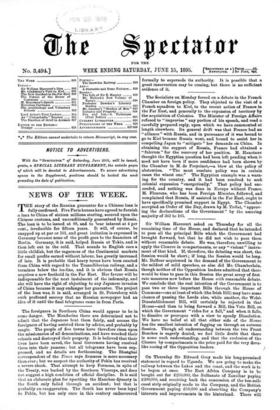The Socialists on Monday forced on a debate in the
French Chamber on foreign policy. They objected to the visit of a French squadron to Kiel, to the recent action of France in the Far East, and generally to the expansion of territory by the acquisition of Colonies. The Minister of Foreign Affairs refused to " improvise " any portion of his speech, and read a carefully prepared reply, upon which we have commented at length elsewhere. Its general drift was that France had an " alliance" with Russia, and in pursuance of it was bound to go to Kiel because Russia went, and bound to assist her in compelling Japan to " mitigate " her demands on China. In obtaining the support of Russia, France had obtained a " fulcrum " for the recovery of her position. M. Hanotaux thought the Egyptian question had been left pending when it need not have been if more confidence had been shown by the Chamber in M. de Freycinet,—a blow at the policy of abstention. " The most resolute policy was in certain cases the wisest one." The Egyptian example was a warn- ing for the country, and it had been resolved to seek colonial expansion "energetically." That policy had suc- ceeded, and nothing was done in Europe without France. M. Flourens, who has been Foreign Minister, followed, and complained that Russia, if assisted in the Far East, ought to have specifically promised support in Egypt. The Chamber accepted an Order of the Day, drawn by M. Trelat, " approv, ing the declarations of the Government" by the amazing majority of 362 to 105.


































